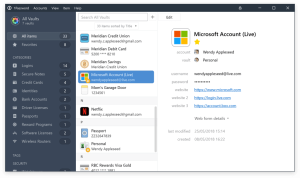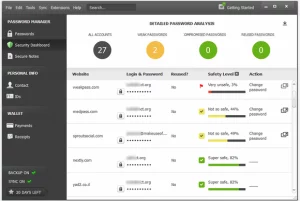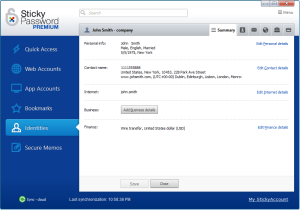Best password managers will keep track of all your logins, including unique passwords for each account. It’s similar to how your phone’s contacts app keeps all of your phone numbers, addresses, and other information so you don’t have to remember them.
Except that a password manager guarantees that such passwords are only accessible to you. They operate by encrypting all of your logins behind a “master” password, which is the only password you need to remember. All logins are encrypted until you input that password, which is why only you have access to your logins. All of the best password managers in this review employ AES-256 encryption, which is the most advanced consumer-level standard available right now.
Most best password managers may utilize your phone’s or PC’s fingerprint or face scanner instead of that master password to make the procedure easier. You shouldn’t forget it, though, since if you do, you’ll lose access to your logins. And if you want to use the same best password managers to remember website logins on a desktop web browser, you’ll almost certainly need to input that master password every time your machine reboots.
And, if you’re wondering why you should use a password manager instead of simply letting your web browser save logins for you, it’s because they function on all common devices and online browsers, allowing you to access your logins from any device, not just Chrome, for example.
Because they all include an autofill option, those usernames and passwords can be automatically inserted into websites and applications, eliminating the need to look them up and copy and paste them, making them extremely convenient.
Best Password Managers
The simple answer is no, because the key reasons for utilizing a password manager are security and convenience, with the former being the most important. And if best password managers can’t keep your passwords safe from hackers, you shouldn’t use it. As a result, it is no longer included in the list below.
1. Bitwarden
Bitwarden differs from its competitors in that its code is open-source. That implies that individuals who can understand code may investigate the intricacies of how it operates, providing significant confidence that it is safe. There’s more good news: Bitwarden is free to use for individuals. Of course, Bitwarden may also store critical information such as credit card numbers, secure notes, and IDs.
If you want more features, such as advanced two-factor authentication, compatibility with authentication services such as Yubikey and FIDO 2, 1GB of encrypted file attachments, and security reports that alert you if any accounts have been compromised, Premium is surprisingly affordable at $10 per year (around £7.50). There’s also a family tier for $40 per year (about £30), which includes six premium accounts. Bitwarden can import passwords from a variety of different best password managers as well as Chrome-based browsers, so you won’t have to input them laboriously or slowly when you visit the numerous websites and applications that require logins.
We encountered problems importing the CSV file produced from another password manager when testing Bitwarden, but only on a mobile device. The same file was accepted without difficulty when we switched to the web-based desktop version. You just need to perform this once, so you won’t be scratching your head after Bitwarden is installed. This app is considered the best on the list of the best password managers in 2023.
3. 1Password
Canadian-based 1Password is another well-known password manager. It is compatible with Windows, macOS, Android, and iOS. It, like other best password managers, keeps your passwords in a safe vault that can only be accessed with your master password (thus the name 1Password).
1Password, like the others in this list, employs strong encryption to keep your logins secure, and it also supports two-factor authentication for further protection. The addition of two keys to unlock accounts is a new feature in this region. The first is your master password, while the second is a machine-generated code of 128 bits. You won’t see it, but knowing there’s an extra layer of security for your data is one of the most crucial features of a password manager. This app is considered the best on the list of the best password managers in 2023.
A collections area allows you to put specific vaults together, so you can keep work and home separate. There are also private and shared vaults, so you may offer others secure access to select passwords without revealing your whole list if necessary. 1Password has a 14-day free trial, following which you can either join up for the Premium tier for $2.99/£3.69 per month (paid annually) or the Family account for $4.99/£6.49 per month (billed annually).
Enpass differs from other best password managers in its approach. It is not required to store your passwords and other sensitive data on a centralized server; you have the option of storing them on your device or with a cloud storage provider of your choice. Obviously, everything remains encrypted and safe, but you have control over where your data is stored. The desktop version of Enpass allows you to save an infinite number of passwords on the free tier; however, the mobile version only allows you to sync 25 things. So, unless you only have a few accounts or internet logins, you’ll need to subscribe in order for all of your passwords to sync to your phone. This app is considered the best on the list of the best password managers in 2023.
Enpass is a strong password manager with some unique features that may make it an excellent alternative for individuals who want more control over their data but are wary of cloud-based best password managers. The free tier on mobile is severely limited, which is unfortunate, but happily it’s a reasonably priced service, with the individual version costing $1.99/£1.62 per month or the family plan, which includes six accounts, costing $2.99/£2.43 per month. A lifetime subscription package is also available, which provides you with one account in perpetuity for $99.99 or £82.99. It’s also worth mentioning that paying unlocks additional services, such as breach tracking.
5. Dashlane
Dashlane is an excellent password manager that provides applications and extensions for all major platforms, ensuring that your passwords are accessible regardless of device. It’s also simple to use, since once configured, it will auto-fill logins, payment data, and forms, with you just needing to check in infrequently to ensure you remember the master password. A notification center notifies you of any possible breaches on sites where you have an account, and it also searches the dark web for comparable data.
Those who have previously used Chrome to save passwords may now immediately import them to Dashlane, making the transfer smooth. You can now enable two-factor authentication for certain sites in Dashlane, causing the app to produce a 6-digit token anytime a login attempt is made. This requires you to visit the site in question, activate two-factor authentication, and then scan a QR code to choose Dashlane as the authenticator app.
It simply takes a few minutes and immediately improves your security. There are four tiers to choose from. There is a free version that allows you to save an unlimited number of passwords and utilize the secure sharing feature on a single device. You can use Dashlane on an unlimited number of devices and get dark web monitoring if you upgrade to the Advanced tier (which costs $3.49 or £2.89 per month). This app is considered the best on the list of the best password managers in 2023.
6. NordPass
NordPAss has long topped our list of the best VPN services. NordPass, the company’s specialized password manager, is also available. It’s accessible as a Chrome, Firefox, Edge, and Opera extension, as well as desktop programs for Windows, Mac, and Linux, and mobile apps for Android and iOS. If you use one of the numerous Chrome engine versions (such as Vivaldi or Brave), the Chrome extension will operate just fine. Passwords may be transferred into NordPass by exporting a CSV file from your previous password manager and then importing it into NordPass. This means you’ll be up and running in seconds instead of hours of putting in passwords for your numerous accounts.
However, everything worked well in other browsers. The free tier allows you to save an infinite number of passwords and use them on various devices, but you must log into each one separately because only one device can use NordPass at a time. Pricing for NordPass Premium is structured similarly to that of the company’s VPN service, with longer subscriptions costing less. The two-year plan cost $1.49/£1.29 per month at the time of writing, while the one-year plan cost $1.99/£1.69 per month. A family plan is also available, which provides six premium accounts for $3.69/£3.09 per month (for one year) or $2.79/£2.39 per month (for two years). This app is considered the best on the list of the best password managers in 2023.
7. Sticky Password
Sticky Password’s design is simple but straightforward. The app takes an innovative approach to passwords and logins, categorizing them as web accounts and app accounts. This is an alternative to the ‘folders’ provided by others here. You’ll discover the usual password-generating tool as well as safe storage for payment information and personal information, which can then be auto-filled on sites or applications alongside their logins. There’s a protected note area as well as one for managing your online favorites.
Getting things up and running is similar to many of the apps on our list in that you’ll need a laptop or desktop to make it easier. The Android app has an import option; however, it requires an SPDB file format, which isn’t commonly seen in other best password managers or browsers. Instead, you’ll need to install the Windows or Mac software (the web option does not allow you to import files), then download the produced SPDB or CSV file and import it into the desktop client.
A premium account is originally priced higher, but if you select the purchasing option, a discount will be applied at the checkout. This means a year of Premium will set you back $29.99 (£26.24). There’s also the option to pay a one-time charge of $79.99 or £69.99 for lifelong Premium status. There is no family package at the moment; however, students can acquire a one-year Premium subscription for $12.95 (£9.59).
8. Keeper
Keeper is a great password manager that is suitable for both individuals and companies. The program generates secure passwords for you and saves them on your device, while also handling auto-fill and logins across platforms and devices. You’ll find the standard personal information and payment details sections, where you may add cards, accounts, and the kind of information you want filled out on forms. It also offers a sophisticated file sharing feature that allows individuals and companies to reliably store files in the cloud and access them when and where they choose.
The major disadvantage is the cost. There isn’t a free tier. You may begin with a 14-day trial, but in order to continue using it, you must pay $34.99 (£24.99) each year, or $74.99 (£59.99) for the Family plan, which includes five accounts. You may also purchase add-on services that augment what Keeper has to offer. These include BreachWatch ($19.99/£14.99 per year), which monitors the web for any security leaks on sites for which you have accounts; Secure Fill Storage (beginning at $9.99/£6.99 for 10GB); and a variety of additional security-related services.
It might rapidly add up, but the basic package should be sufficient for the majority of users who want a password manager. There are also several business-focused options available, and organizations can get an estimate from Keeper to determine the cost of a year’s membership. Keeper is available for Windows, macOS, Linux, Android, and iOS, with plug-ins and extensions for all major web browsers. This app is considered as best password managers in the 2023.








